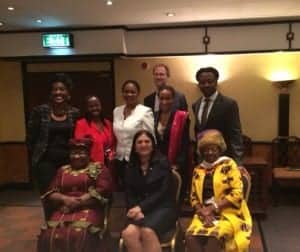Like most of my friends and family, I have always taken the existence of my bank account for granted (even if occasionally bemoaning its contents). But more than one billion women around the world lack access to formal bank accounts and the security they provide as a safe, reliable means to store – and save – money. In emerging economies, the need for this tool is particularly acute among low-income women, who make up the majority of informal economy worldwide.
Last November, I had the privilege of attending the inaugural meeting of Women’s World Banking’s Africa Advisory Council. The Council is composed of 12 high-profile African leaders and was born from Women’s World Banking’s collaboration with Financial Sector Deepening Africa (FSDA), a regional program promoting financial inclusion across sub-Saharan Africa. FSDA supports Women’s World Banking in creating financial services tailored specifically to women’s needs in Nigeria, Tanzania, and Malawi.

While forming the Africa Advisory Council, we felt it was essential to draw from a broad base of individuals in order to gain a comprehensive understanding of not only regional conditions, but also industry trends that could affect financial inclusion efforts. We made sure that our membership included leaders within the financial services and capital markets sector, as well as representation from pan-African financial inclusion circles.
We also needed a comprehensive understanding of the complexity and scope of the technology issues involved. Given the enormous potential for expanding financial services through the use of mobile phones in Africa, it was critical to have voices from the technology and telecommunications sectors. In addition, corporations play a powerful role in integrating low-income women into value chains and provide a useful platform for raising awareness of efforts toward women’s economic empowerment.
Given these demanding requirements, we were delighted to be able to form our inaugural Council with members from a wide variety of regions, industries, and with distinct areas of expertise, including:
Dr. Ngozi Okonjo-Iweala (Honorary Co-Chair; Minister of Finance – Nigeria)
Dr. Jennifer Riria (Honorary Co-Chair; Group CEO, Kenya Women Holding Company Ltd. – Kenya)
Mr. Ade Ashaye (Country Manager, Visa West Africa – Nigeria)
Ms. Anne-Marie Chidzero (CEO, Financial Sector Deepening Mozambique & CEO, AfriCap Microfinance Investment Company – Mozambique / South Africa)
Ms. Geraldine Fraser-Moleketi (Special Gender Envoy, the African Development Bank – Côte d’Ivoire)
Dr. Frannie Léautier (Partner and Chief Executive Officer, Mkoba Private Equity Fund – Tanzania)
Ms. Debra Mallowah (Vice President and Personal Care Lead, Unilever Africa – Kenya)
Mr. Luke Mckend (Country Manager, Google South Africa – South Africa)
Ms. Elisabeth Medou Badang (CEO, Orange Cameroon – Cameroon)
Ms. Nomkhita Nqweni (Chief Executive, Absa Capital, Wealth and Investment – South Africa)
Dr. Monique Nsanzabaganwa (Vice Governor, National Bank of Rwanda – Rwanda)
Ms. Arunma Oteh (Former Director General, Nigerian Securities and Exchange Commission – Nigeria)
While we were excited by the Council’s potential to advocate more widely for women’s economic empowerment, we were conscious of the need to translate the Council’s collective passion into a clear, actionable goal. As a result, the focus of our first meeting was to not only familiarize the Council with Women’s World Banking’s work in greater detail, but to work together to develop a framework for tracking our collective success. At the meeting, we were pleased to find that the Council members had the same questions:
- What do we collectively bring to the table?
- Do we have access to research that will help us?
- What will we be able to say we have done as a result of the Africa Advisory Council?
The Council offers Women’s World Banking a rare and valuable resource in terms of both access and expertise: we’ve gained a set of advisors on technical issues, as well as a passionate group of advocates for broadening women’s financial inclusion across Africa.
The Council’s next meeting will focus on exploring the use of technology to more effectively serve low-income African women. Recent innovations in using “mobile money” to reach un- and under-banked clients have shown promise, but there is the potential to reach many more such clients by better understanding the needs of women in developing mobile money products. With the right strategy and the right partnerships, digital finance has the potential not only to aid Africa’s unbanked, but to provide substantial benefits to the institutions willing to serve them.



